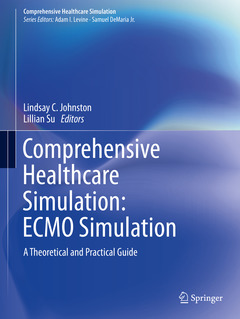Description
Comprehensive Healthcare Simulation: ECMO Simulation, 1st ed. 2021
A Theoretical and Practical Guide
Comprehensive Healthcare Simulation Series
Language: English
Subject for Comprehensive Healthcare Simulation: ECMO Simulation:
299 p. · 21x27.9 cm · Paperback
Description
/li>Contents
/li>Biography
/li>Comment
/li>
This book focuses on the technical, cognitive, and behavioral skills needed to implement an extracorporeal membrane oxygenation (ECMO) simulation program. It describes these programs on the individual, team, and hospital system level, and includes the history of ECMO simulation, its evolution to its current state, and future directions of technology and science related to ECMO simulation.
Divided into six sections, chapters describe both the theoretical as well as the practical aspects of ECMO simulation, including a pictorial guide to setting up an ECMO simulation circuit and how to recreate ECMO emergencies. It is a pragmatic guide that emphasizes the necessary practical items and discussions necessary to plan, set-up, orchestrate, and debrief ECMO simulations for different types of learners in different
Comprehensive Healthcare Simulation: ECMO Simulation - A Theoretical and Practical Guide is part of the Comprehensive Healthcare Simulation Series, and this book is intended for educators, simulation technologists, and providers involved in ECMO programs who recognize the value of simulation to improve ECMO outcomes.
Lindsay C. Johnston, MD, MEd
Associate Professor of Pediatrics, Yale School of Medicine
Yale – New Haven Children’s Hospital
Department of Pediatrics
New Haven, CT
USA
Lillian Su, MD
Clinical Associate Professor of Pediatrics
Stanford University
Department of Pediatrics
Division of CardiologyPalo Alto, CA
USA
Focuses on the technical, cognitive, and behavioral skills needed to implement an ECMO simulation program
Provides a high-quality pictorial guides to setting up an ECMO simulation circuit and how to recreate ECMO emergencies
Features an international authorship of experts in the field




